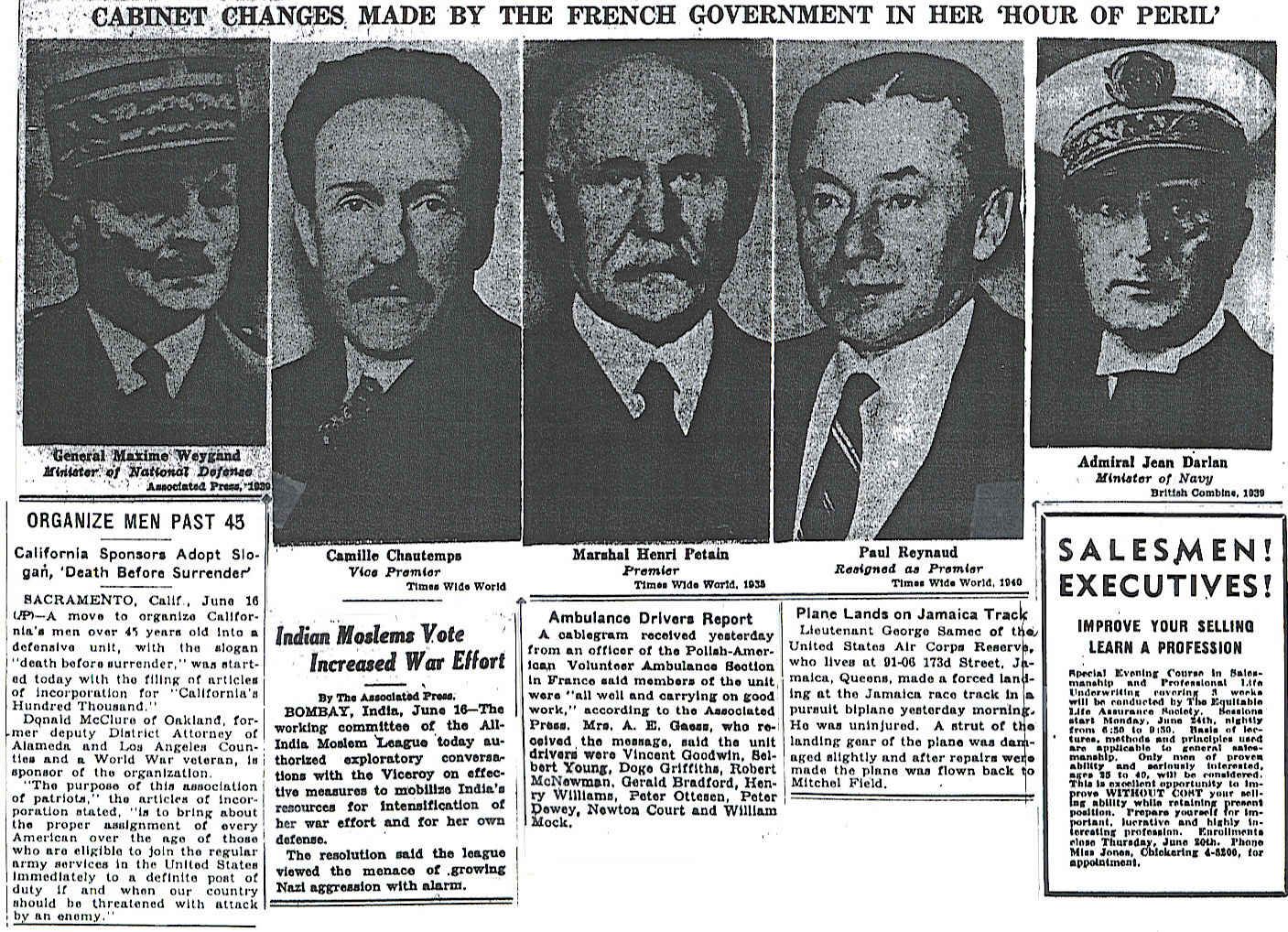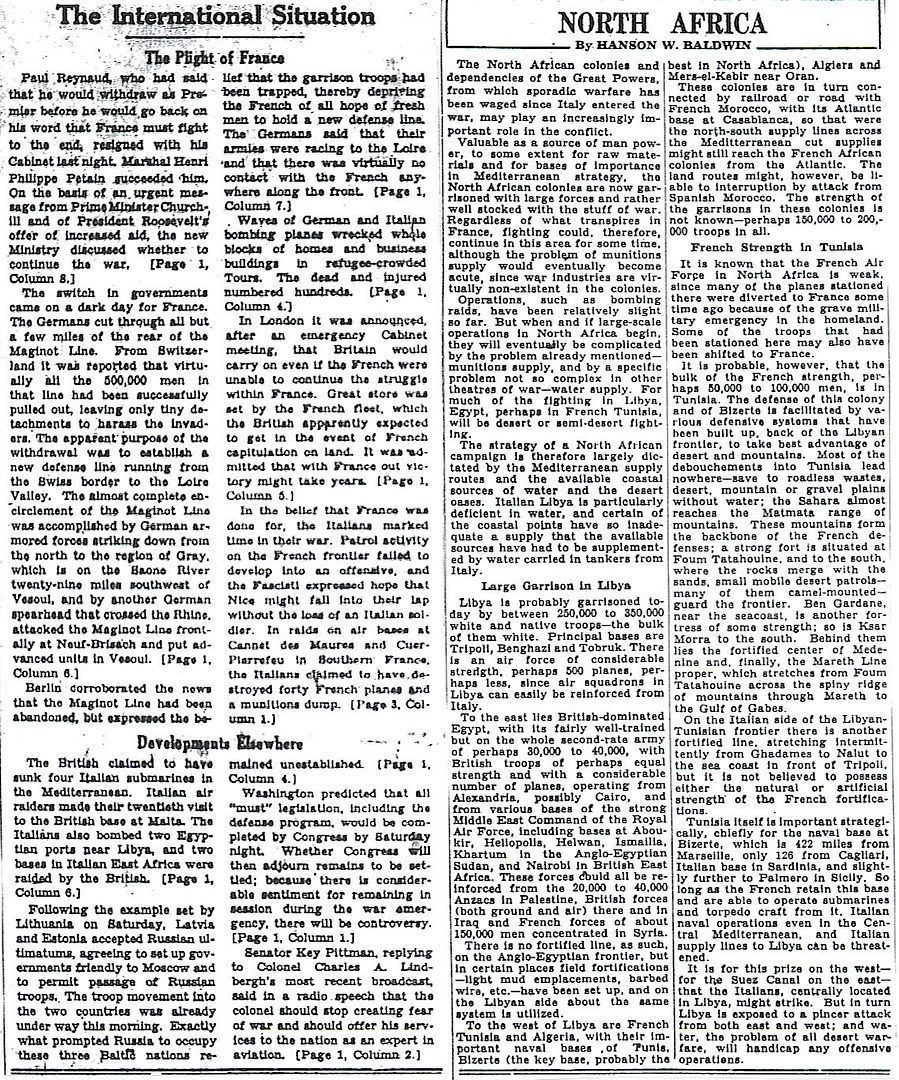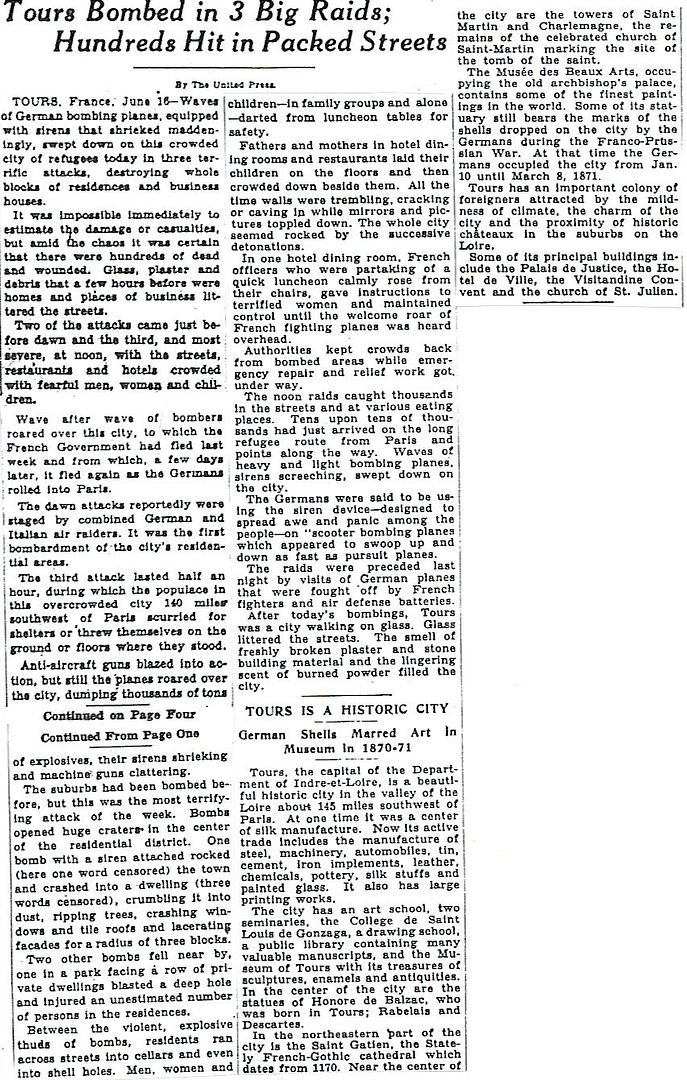
Posted on 06/17/2010 4:59:00 AM PDT by Homer_J_Simpson














Absolutely fascinating. Journalists were so good then. Factual reporting without excessive editorial comments like mine. Thanks for post.
About now the fate of the French fleet comes into bitterly sharp focus.
If it had stayed in (fighting) allied hands, then the North African campaign would have been a great deal easier - Italy’s fleet would have been bottled up with more capacity to spare. The Med would have become an English lake, though German air power would still have been a formidable problem. The Afrika Korps might never have established any kind of foothold in North Africa.
Also Singapore would have been far more secure. All those extra battleships, and suddenly the early war in the pacific might have had a different character. Japan might have ‘gone north’ instead, Russia would have fallen and the whole world be different today.
All depending on the fate of the French fleet.
As it was, the fleet had to be sunk. If the Germans had taken it intact, then the war would have been over in weeks.
http://www.onwar.com/chrono/1940/jun40/f17jun40.htm
Their Finest Hour
Monday, June 17, 1940 www.onwar.com
In Britain... Churchill broadcasts saying that the Battle of France is over and that the Battle of Britain is about to begin. His message is “Let us so bear ourselves that, if the British Empire and Commonwealth last for a thousand years, men will still say, This was their finest hour.”
In France... The Petain Cabinet takes office. Weygand is Minister of Defense. They announce that they are asking Germany for armistice terms. The British government understands that these will only be accepted on the condition that the French Fleet does not fall into German hands. Equally it is the German policy to stop the French Fleet and colonies from joining Britain and this is the reason for their comparative leniency in allowing the establishment of Vichy as a focus for the loyalty for the French. French representatives in the USA do allow the British to take up arms orders they have made under the “Cash and Carry” rules.
On the Western Front... Pontarlier, almost on the Swiss border, is reached by Guderian’s forces. Other units have nearly reached the Loire and still more are advancing in Brittany and Normandy.
http://homepage.ntlworld.com/andrew.etherington/month/thismonth/17.htm
June 17th, 1940
UNITED KINGDOM:
RAF Bomber Command: 4 Group (Whitley). Bombing - oil plant at Gelsenkirchen - Mining River Rhine.
10 Sqn. Seven aircraft ‘W’ bombs in Rhine. Four aborted, three bombed. Three aircraft to Gelsenkirchen. Flak intense. All bombed.
51 Sqn. Seven aircraft to Gelsenkirchen. Flak intense. All bombed. Four aircraft ‘W’ bombs in Rhine. Three aborted, one bombed.
58 Sqn. Ten aircraft to Gelsenkirchen. Nine bombed, one FTR.
77 Sqn. Nine aircraft to Gelsenkirchen. Two returned early, seven bombed.
London: “Let us brace ourselves to our duty and so bear ourselves that if the British Commonwealth and Empire lasts for a thousand years men will still say, ‘This was their finest hour’.” With this inspirational peroration Winston Churchill today ended a speech in the House of Commons. It was later repeated in a broadcast to the nation. The Prime Minister faced up squarely to the chance that Britain might now have to fight alone and he told MPs: “Our professional advisers of the three services unitedly advise that we should continue the war and that there are good and reasonable hops of final victory.”
The Prime Minister said that it was not yet certain that France’s military resistance to the Germans was over. Britain had not felt able to release the French from their treaty obligation not to make a separate peace. But whatever happens, he continued: “We will fight on, if necessary for years.” The Battle of Britain was about to begin and Hitler knew that he “will have to break us in these islands or lose the war.”
Mr Churchill said that 1,250,000 men are now under arms in Britain. Behind them are 500,000 Local Defence Volunteers, and soldiers from the Dominions have also arrived. These forces include seven out of every eight soldiers originally sent to France, while many of the remainder are still operating alongside French forces with considerable success. As for the immediate future, the Prime Minister reminded the House of Commons that Britain has home defence forces which are now expanding rapidly, with “very large additions” to their weaponry expected soon. He then said that the survival of Christian civilisation as the well as the continuity of British life must depend on the outcome of the Battle of Britain. He warned the United States that, if Germany wins, then the whole world, including America, “will sink into the abyss of anew dark age”. The Commons decided to go into secret session before the end of the week for further discussion of the dire military situation. Churchill told MPs that the scope of the debate would not be too restricted. He was insistent that the service chiefs are prepared for enemy parachute landings and other ingenious invasion tricks, including, he said, help from a “fifth column”.
FRANCE: St. Nazaire: Operation ‘Aerial’: The Cunard White Star liner ‘Lancastria’ (16,234 GRT, Captain Rudolphe Sharpe, Master) is sunk off Saint Nazaire with the loss of nearly 3,000 men. Five aircraft from KG30 (Kampfgeschwader 30) flying Do-17’s, using the SC-500 high-explosive ordnance, dive-bombed and machine-gunned the liner as she lay at anchor. Survivors claimed later that the Germans had continued to fire after the ship had sunk and men were struggling in the water. The liner had been converted into a troopship. Most of the passengers were troops from the BEF and the RAF returning to England. In addition there were Church Army workers and a number of French people fleeing the German occupation. The horror was not over with the sinking.
The Luftwaffe aircraft continued to circle. Diving out of the sky, the planes strafed the survivors in the water and on the sinking ship. Some aircraft dropped incendiaries into the water in an attempt to light the free-flowing oil which leaked from the doomed LANCASTRIA”.
This is Britain’s worst maritime disaster. She arrived off St. Nazaire at 0400 on 17 Jun and anchored in the Charpentier Roads. Destroyers and other craft were used to ferry people out to the troopship. An estimated 6,000 servicemen and a number of civilian women and children when onboard, although some reports indicate that as many as 9,000 people may have been in the ship when it was hit by four bombs as approximately 16 -00. One bomb was a direct hit, which went down the ship’s large single funnel and exploded in the engine room. The ship capsized at 16 -15 and sank soon afterwards. The bomb explosion in the engine room ruptured one of the ship’s bunkers and flooded the sea with heavy fuel oil, making rescue operations extremely difficult. Fewer than 2,500 people survived. The large liner Oronsay (20,000 GRT) was also bombed but she remained afloat and reached port safely. News of the disaster was suppressed by the British Government because of the impact it might have had on the country’s morale. It was announced over a month later. Captain Sharpe survived the sinking and went on to become the master of the liner Laconia (19,695 GRT). He was with her when she was sunk on 12 Sep 42 by U-156, Kptlt Werner Hartenstein, CO, off the coast of West Africa. Captain Sharpe was among the more than 2,000 lost in this event, making it the second worst British maritime disaster. (Dave Shirlaw) See http://www.lancastria-association.org.uk
Brooke continues supervising the embarkation of his forces using the French telephone system to talk with subordinate commanders. This afternoon he learned learns from London that a French-German armistice might be concluded at any moment and the he and his troops might be interned under terms of that armistice. In the evening at St. Nazaire he, and his party of 14, embarked on H.M.T. Cambridgeshire which was to be part of a convoy escort. (Jay Stone)
Guderian reaches Pontarlier almost to the Swiss Border. German forces reach Brittany, Loire and Normandy.
Dijon is captured by elements of Hoepner’s XVI A.K. (mot.) (Jeff Chrisman)
With German forces pouring through the Maginot Line, Petain’s government sues for peace.
The 2nd, 3rd, 5th and 8th French Armies are cut off in the Maginot Line and fighting on two fronts.
GERMANY: U-206 laid down.
U-106 launched. (Dave Shirlaw)
MEDITERRANEAN SEA: The French sink an Italian submarine off Oran in Algeria.
This sub was the Provana, the first Italian submarine to be sunk in the Mediterranean, which went down after being rammed. Five more Italian boats would be lost in the Mediterranean before the end of June (and four more in the Red Sea), making it a tough month for the Italian “somergibili.” (Andy Etherington and Mike Yaklich)
U.S.S.R.: Moscow: Stalin sends troops to occupy Estonia and Latvia in order to “pre-empt joint defence measures against the USSR.”
FRENCH INDOCHINA: Japan starts a blockade to cut off military supplies to China.
U.S.A.: The French surrender raises concerns in the U.S. about the French fleet but French Minister for Foreign Affairs Paul Baudouin advises the Deputy U.S. Ambassador to France that the fleet “would never be surrendered to Germany.” (Jack McKillop)
The Chief of Naval Operations asks Congress for the money to build a two-ocean Navy. (Dave Shirlaw)
ICELAND: The 146th Brigade arrive to reinforce the 147th Brigade of the British occupying forces. (Dave Hornford)
ATLANTIC OCEAN: SS Elpis sunk by U-46 at 43.46N, 14.06W. (Dave Shirlaw)
http://worldwar2daybyday.blogspot.com/
Day 291 June 17, 1940
Rumors of surrender demoralize the French troops and embolden the Germans. Rommel (recuperating and re-equipping 7th Panzer since June 11) decides to gamble all and head for Cherbourg to prevent the Allied evacuation. His tanks and trucks laden with infantry travel 125 miles. In Eastern France, Guderian’s Panzers reach the Swiss border at Pontalier, encircling 17 French divisions manning the Maginot Line.
Operation Ariel continues evacuating Allied troops from Cherbourg, St Malo, Brest and St. Nazaire. British Cunard liner Lancastria embarks 4,000 to 9,000 British civilians, troops and RAF personnel in the Loire estuary. At 3:48 PM, she is hit by 3 bombs from Junkers Ju88s (1 bomb goes down her funnel and explodes in the engine room) and sinks in 20 minutes. There are 2,477 survivors (ASW trawler Cambridgeshire rescues 900). It is the worst tragedy in British maritime history and the single greatest loss of life for UK forces in any single engagement in WWII. http://www.bbc.co.uk/history/worldwars/wwtwo/lancastria_01.shtml
Soviet occupies Latvia and Lithuania, meeting little resistance. In Estonia, the government surrenders and agrees to Soviet occupation. Most of the Estonian army and the volunteer militia Estonian Defence League lay down their arms. The Single Signal Battalion will hold out in Tallinn until June 21.
Determined to continue fighting, General Charles de Gaulle and other senior French officers refuse to serve the new French government and leave for London with 100,000 francs in gold provided by the ex-PM Paul Reynaud.
U-46 sinks Greek steamer Elpis carrying wheat 250 miles West of Cape Finisterre, Spain. All 28 crew abandon ship. http://www.uboat.net/allies/merchants/ships/356.html
thanks. intersting short piece on the role of governemnt in industry and prices. amazing how not much has changed..for the better.
As long as the U.S continued its embargo of Japanese purchases of metals and particularly petroleum, there was no way the Japanese would go north. The Navy wouldn’t allow it.
As the French campaign plays out, Stalin decides it’s a good time to cash in his part of the Secret Protocol to the Non-Aggression Pact. The Soviet occupation of those states does not sit well with most inhabitants.
Interesting to note that the refugees of the Baltic States governments, as well as many people of German descent, are looking to exit those former countries. And they are trying to get to Germany. People who know the roads, the villages, the cities and all the important terrain.
Hmmm....I wonder if the Soviets will hear from them again. Maybe about a year from now.
The excerpt in reply #4 above mentions a broadcast he made on the 17th, but not his speech before the House of Commons.
Two minor items from today’s news or interesting. First, the main organization of Indian Muslims, apparently not seeing itself first and foremost as part of the larger Umma, pledges to do their part as subjects of the British Empire. Second, a history of Tours doesn’t even see any need to mention Charles Martel, who looms so large in the thoughts of many these days. How quickly things can turn.
I really think the bloody nose the Japanese received at Nomonhan complements of Zhukov last year pretty much dashed any ideas of making a northern move against the Soviets. The Japanese will sign and cling to a non-aggression pact with the Soviets even before making a move for the Dutch East Indies. Couple that with the Navy-Army power struggle shifting to the Navy, the move for resources southward almost became inevitable.
Another move that could have happened would have been through India though. If the Nazi’s and the Japanese were committed to creating a physical border they both could have made moves through the southern belt of Asia. Japan into India and Germany, via North Africa, through the Middle East. As it stood though, the two powers were never very interested in the others sphere of interest and no concerted effort was made to join up. Japan did eventually invade India, but not until 1944 when it was pretty much over anyway, and the attack was a disaster. Germany never put the resources into North Africa to allow a push all the way into the Middle East, and the successful coup in Iraq moving it to Germany’s sphere of influence was quickly crushed by the British.
Yes, the Japanese had a very healthy respect for the Red Army. And keep in mind that their bloody nose was inflicted by a purge-depleted Red Army. The same Red Army that entered Poland like a traveling circus show. The same Red Army that was humbled by tiny Finland. Yeah, that Red Army. I’m not so sure the Germans put much stock in their Japanese Allies on the ground. Their navy was another matter; Hitler believed they were more than a match for the USN and for a time, he was right.
I’ve gone back and forth on Hitler’s Mediterranean/Middle East Policy, or lack thereof. The military units necessary to march to the Persian Gulf looks pretty marginal. With some air assets he could have kept the British out of the Eastern Mediterranean and left it a German-Italian lake. However, I’m not sure whether the Germans and Italians were capable of logistically supporting such a venture. My guess is that the Axis had to clear the British from Egypt and Suez, and gain a port in the eastern Med with sufficient shipping capacity and a good rail line into the interior to support their army. They didn’t have the motor transport necessary, certainly not if the Germans were going to invade the USSR too. And that was one campaign Hitler was not going to pass up.
(You will note that whenever I talk strategy, I always get bogged down with nagging logistical details.)
Hitler never really understood any sort of maritime strategy. And he was a victim of his alliance with Mussolini. For the sake of national pride, Il Duce insisted that North Africa be primarily an Italian theater, and Hitler acquiesced. Hitler was way too busy with his obsession with the USSR to consider Africa anything more than an Italian sideshow. And history made it quite clear that even with one hand tied behind their backs, the British could do whatever they wanted with the Italians.
The logistics of a German move in the Middle East has always made me wonder as well. After all, my entire thesis is based on the superior capabilities of the Americans logistically with their fully motorized Army. This was a feat the Germans could not achieve. The long supply lines of a push all the way into the Middle East would probably have been just as impossible as they were in Russia at the extent of their advance. However, if they had made that move, even at the expense of preempting the invasion in Russia it would have been devastating for the Jews in Palestine. They would have been over run by the Nazi’s and there would have been a numerically superior Arab population that would have readily joined in a pogrom to rid the region of their Jews. The map today would be very different even if the Germans would not have been able to hold onto those gains. It also would have closed off the Suez Canal to the Allies forcing all the supply lines into the Atlantic.
But like you said, Russia, and particularly the bread basket of the Ukraine was a strategic goal that Hitler could not pull himself away from. It was so important that he couldn’t wait to deal a final blow to Britain before engaging them and set himself up for the two front war that he himself stated in Mein Kampf, as the worse possible thing a leader can do.
Disclaimer: Opinions posted on Free Republic are those of the individual posters and do not necessarily represent the opinion of Free Republic or its management. All materials posted herein are protected by copyright law and the exemption for fair use of copyrighted works.